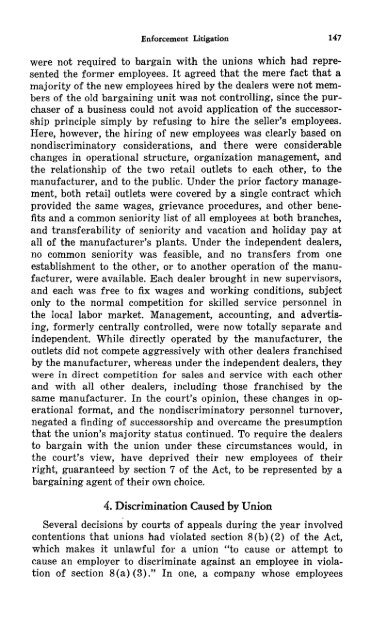1 - National Labor Relations Board
1 - National Labor Relations Board
1 - National Labor Relations Board
You also want an ePaper? Increase the reach of your titles
YUMPU automatically turns print PDFs into web optimized ePapers that Google loves.
Enforcement Litigation 147<br />
were not required to bargain with the unions which had represented<br />
the former employees. It agreed that the mere fact that a<br />
majority of the new employees hired by the dealers were not members<br />
of the old bargaining unit was not controlling, since the purchaser<br />
of a business could not avoid application of the successorship<br />
principle simply by refusing to hire the seller's employees.<br />
Here, however, the hiring of new employees was clearly based on<br />
nondiscriminatory considerations, and there were considerable<br />
changes in operational structure, organization management, and<br />
the relationship of the two retail outlets to each other, to the<br />
manufacturer, and to the public. Under the prior factory management,<br />
both retail outlets were covered by a single contract which<br />
provided the same wages, grievance procedures, and other benefits<br />
and a common seniority list of all employees at both branches,<br />
and transferability of seniority and vacation and holiday pay at<br />
all of the manufacturer's plants. Under the independent dealers,<br />
no common seniority was feasible, and no transfers from one<br />
establishment to the other, or to another operation of the manufacturer,<br />
were available. Each dealer brought in new supervisors,<br />
and each was free to fix wages and working conditions, subject<br />
only to the normal competition for skilled service personnel in<br />
the local labor market. Management, accounting, and advertising,<br />
formerly centrally controlled, were now totally separate and<br />
independent. While directly operated by the manufacturer, the<br />
outlets did not compete aggressively with other dealers franchised<br />
by the manufacturer, whereas under the independent dealers, they<br />
were in direct competition for sales and service with each other<br />
and with all other dealers, including those franchised by the<br />
same manufacturer. In the court's opinion, these changes in operational<br />
format, and the nondiscriminatory personnel turnover,<br />
negated a finding of successorship and overcame the presumption<br />
that the union's majority status continued. To require the dealers<br />
to bargain with the union under these circumstances would, in<br />
the court's view, have deprived their new employees of their<br />
right, guaranteed by section 7 of the Act, to be represented by a<br />
bargaining agent of their own choice.<br />
4. Discrimination Caused by Union<br />
Several decisions by courts of appeals during the year involved<br />
contentions that unions had violated section 8 (b) (2) of the Act,<br />
which makes it unlawful for a union "to cause or attempt to<br />
cause an employer to discriminate against an employee in violation<br />
of section 8(a) (3)." In one, a company whose employees

















